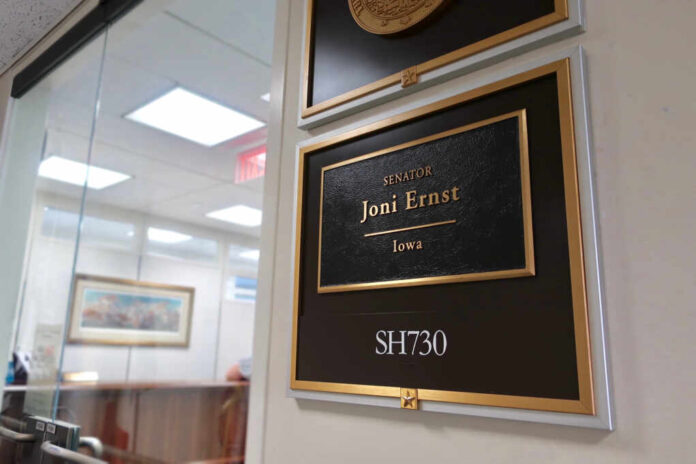
In a move toward transparency and fiscal responsibility, Sen. Joni Ernst (R-IA) introduced the Taxpayer-Funded Union Time Transparency Act this week. The bill revealed during Sunshine Week, an annual celebration of openness in government, demands greater accountability on how American taxpayers’ dollars are being used to subsidize federal employee unions.
The proposed measure mandates federal agencies to generate annual reports detailing the financial burden to taxpayers for union-related activities, otherwise known as “official time.” This comes in response to the halt of such reporting under the Biden administration. 2019 is the last year for which figures are available. The Office of Personnel Management (OPM) reported that for 2019, public union activities under official time cost taxpayers at least $135 million. More than 2.6 million work hours of federal employee official time was used on union tasks rather than serving the public.
The proposed law is designed to create transparency into the now-obscured expenses and ensure that public funds are not financing union agendas. “It’s absurd that Iowans are forced to pay for federal employee unions that are fighting tooth and nail against workers returning to the office,” Ernst said.
Biden’s bureaucrats are working on behalf of themselves while secretly billing taxpayers for union activities.
Every cent of Iowans' hard-earned tax dollars should be serving Iowans.https://t.co/WCRHYrmCWE— Joni Ernst (@SenJoniErnst) March 14, 2024
The legislation’s introduction coincides with broader criticisms of the Biden administration’s transparency, particularly concerning the cessation of annual reporting by the OPM. Critics argue that this lack of transparency undermines the principle of accountability and favors union power over taxpayer interests. The move has sparked concern among fiscal conservatives and transparency advocates, who argue that taxpayer money should not underwrite the operational costs of federal employee unions, primarily when such funding supports activities contrary to the public’s interest.
Historically, “official time” has enabled numerous federal employees to engage exclusively in union activities while remaining on the government payroll, a policy costing millions annually. This practice, under scrutiny, has raised questions about the balance between supporting worker rights and ensuring that public funds are allocated efficiently and transparently.
Biden Hides Public Records Showing How Much Taxpayers Are Paying Unions https://t.co/Sge3TpqFCw pic.twitter.com/x7N2QiVezT
— Daily Wire News (@DailyWireNews) March 14, 2024
Rep. Scott Franklin (R-FL), who supports the bill in the House, emphasized the negative impact of pandemic-induced telework policies, which have led to service backlogs and decreased efficiency in federal agencies. He argued that American taxpayers deserve better than to finance empty federal buildings and subpar service while funding union activities that hinder efforts to return to normalcy.
As the debate unfolds, the Taxpayer-Funded Union Time Transparency Act is a testament to the ongoing struggle between governmental transparency, union influence, and the proper stewardship of taxpayer dollars. This legislation underscores a significant push toward ensuring that public funds are used in ways that directly benefit the citizens they are intended to serve.














